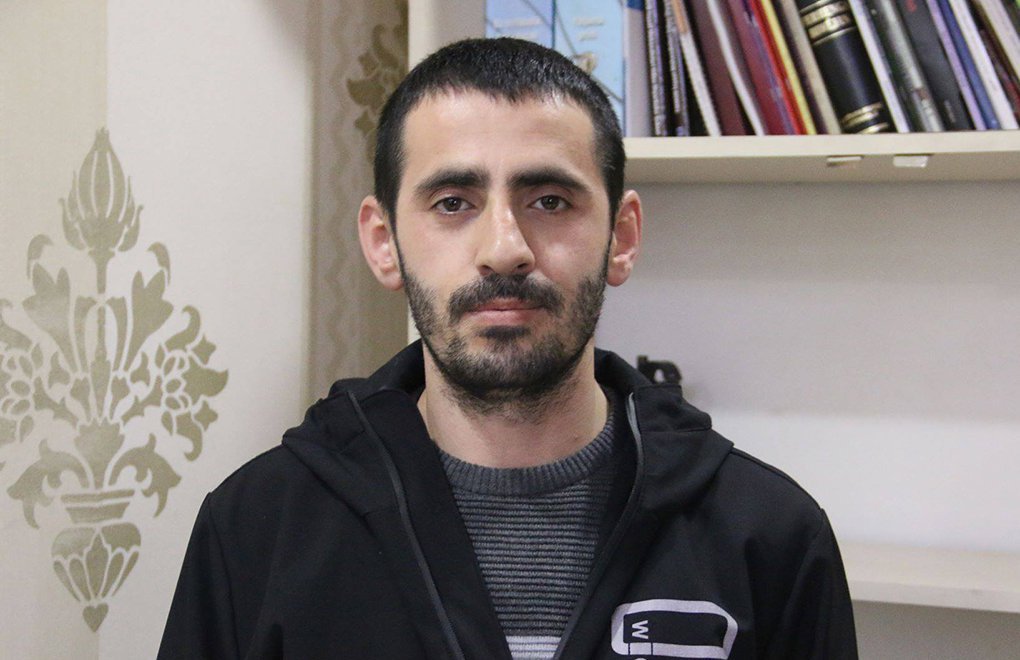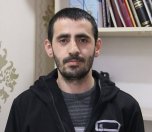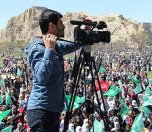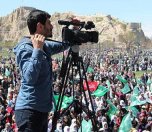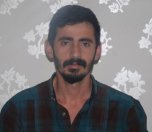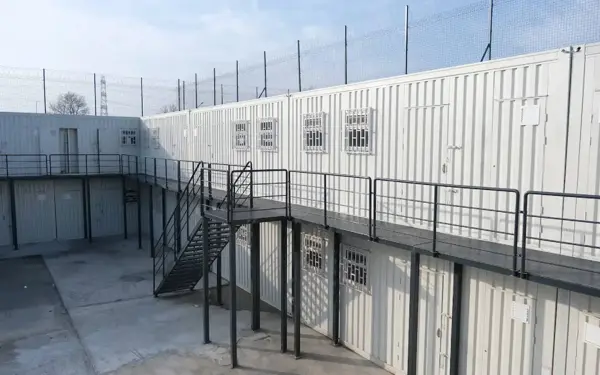* Photo: Seda Taşkın / MLSA
Click to read the article in Turkish / Kurdish
İdris Sayılğan... He was a reporter for the Dicle News Agency (DİHA), which was closed by a Statutory Decree. He was detained in a house raid in Muş on October 17, 2016. He was arrested on charge of "being a member of a terrorist organization" on October 24, 2016. Held in Muş Prison for two weeks, he was referred to Trabzon Type E Prison without any justification.
When his indictment was finally prepared, he had been behind bars for nine months. The prosecutor demanded that Sayılğan be sentenced to 7.5 to 15 years in prison. As criminal evidence, the indictment referred to his news, phone calls with news sources and social media messages.
He was released 1,137 days later
It was a year and a month after his arrest that he could finally have his first hearing at Muş 2nd Heavy Penal Court. As he was not allowed to attend the hearing in person, he attended it via Audio and Visual Information System (SEGBİS). His request for making his defense in person was constantly rejected till his final hearing.
On January 25, 2019, he was sentenced to 8 years, 3 months in prison. Just when he had lost hope of being released, the appeal of his lawyers was accepted and he was released from prison by the verdict of Erzurum Regional Court of Justice, the court of appeal. When he was released on November 27, 2019, he had been behind bars for 1,137 days.
We have talked to Sayılğan about his judicial process and time in prison...
'I am proud of my news'
"I was detained in a raid conducted to my house at around 4 in the morning on October 17, 2016. While I was being detained, my family and I were subjected to torture and insults.
"I was held in custody for eight days. Arrested for 'membership of an organization' by Muş 2nd Heavy Penal Court, I was taken to Muş Type E Closed Prison. Being held there for two weeks, I was suddenly exiled to Trabzon Type E Closed Prison one morning.
"I had my first hearing 13 months after being arrested. The indictment referred to the news I reported and the calls I made with my news sources about news. In response to the indictment, I briefly indicated that I was a journalist, I was proud of the news I made and would continue making news. I told them that the trial was not a judicial, but a political one.
"When the trial ended, I was sentenced to 8 years, 3 months in prison. I was held in prison for over three years. Going over the case after the local court, Erzurum Regional Court of Appeal upheld the verdict and gave a ruling of release considering my long period of arrest.
'ECtHR accepted my application'
"In the meanwhile, I appealed to the Constitutional Court and to the European Court of Human Rights (ECtHR). While the Constitutional Court left my application unanswered for over a year, the ECtHR accepted my application and decided to conduct a priority review of my application. I think that a favorable verdict will be given by the ECtHR.
"It must be - of course - a result of the policy of silencing dissidents by courts that investigations never ceased. Four investigations were launched against me due to my news. In one of these investigations, a prison sentence of 8 years, 3 months for membership of an organization was given; in another, a verdict of non-prosecution and in yet another, a verdict of acquittal...
"In the final case, seven news cited in the indictment that sentenced me to 8 years, 3 months in prison on the alleged charge of organization membership have been turned into another case file that now charges me with propagandizing for a terrorist organization. My first hearing will be held at Muş 2nd Heavy Penal Court on January 8. The state of courts is pathetic. I would like to say that I do not expect anything from them for that reason.
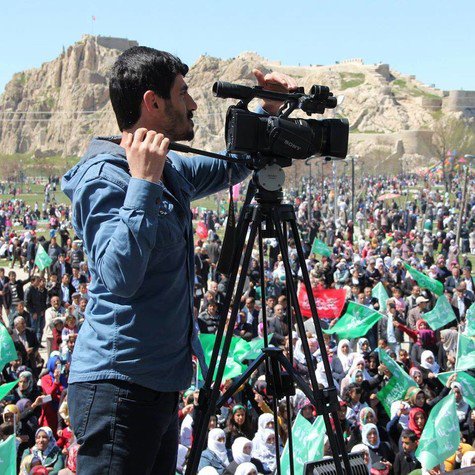
First day in prison...
"My first day in prison was nice. While meeting with others in the ward, I saw that a page of daily Özgür Gündem was pinned to the fridge with a news of mine. It was a news on a stone pit polluting the environment in Ağrı. I got happy for seeing my news in an old-dated newspaper. It felt good. I showed it to others and told them 'I am in the right place.' It was a good memory for me. I spent the first day getting to know the prison and the ones in the ward.
"In the evening, we played a game that we called 'gur u gundi'. It was also fun and nice. We played this game a few more times during my two weeks in Muş. Then, I was exiled to Trabzon.
"Here, I would like to say a few words about the policy of exiles. According to laws, an arrested-convicted person has the right to be held in a prison closest to the place of residence of his or her family.
"However, the AKP [ruling Justice and Development Party] government exiles political arrestees-convicts to prisons away from their families in defiance of the laws and, thereby, it aims to isolate them, prevent visitations, raise economic difficulties that would end in an economic isolation and cow them into submission. It is an outrageous and inhumane situation.
'They acted with feelings of hatred'
"When I was taken to Trabzon Prison, I was subjected to an imposition of naked body search at the prison entrance. I was battered as I did not accept it. There were eight people in the ward exiled from Şırnak Prison two weeks ago. All of them were severely battered.
"Though they had been there for two weeks, their bodies were still full of bruises. Some of the wardens were taking a very bad attitude and acting with feelings of hatred.
'I always opposed naked body search'
"In my final hearing, my request for being at court in person was accepted. It would be the first time that I was physically at court. We set off on January 17 to attend the hearing on January 25. That night, I stayed at Patnos Type L Closed Prison as a guest. I was subjected to the imposition of naked body search at prison entrance. When I did not accept it, I was battered again.
"We set off early in the morning and reached Muş Prison at noon. They are so obsessed with doing a naked body search that I was subjected to it there as well and I was battered again as I did not accept it. Naked body search is a degrading treatment.
"They want to give you the message: 'Here we are, I am the state and you are just nothing standing before me naked.' It is a treatment damaging human dignity. It needs to end.
'I made news even in prison'
"While I was in prison, I made news about the violations of rights committed there. My letters containing my news were seized by the prison administration for several times.
"To be honest, when I went to prison, I did not think that I would stay there so long and, especially I would receive such a punishment. 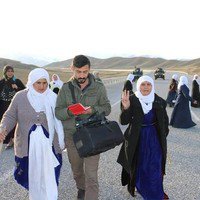 But, I soon worked out a plan and started doing research-examinations. I spent a considerable amount of my time reading.
But, I soon worked out a plan and started doing research-examinations. I spent a considerable amount of my time reading.
"I can say that I went through a productive process in that regard. Prison was indeed a difficult period, but striving to improve oneself instead of obsessing with hardships would have more correct results. You live in a narrow space, you bump into wall after seven steps. You stay in tiny rooms with several people.
"It might be quite an abrasive process if one does not seriously program oneself. For that reason, being occupied with improving oneself, rather than with hardships, would keep one on their feet.
'My release was a surprise'
"The judicial process was an utterly political one. No matter how meaningless it was to us that my news and phone calls with news sources were cited as criminal evidence, they mean something to them... They see themselves responsible for intimidating the dissidents. They are not impartial or independent. It was not a surprise that the Court of Appeal upheld my sentence.
"After the local court announced its verdict, I convinced myself that I would serve the whole prison term behind bars. But, being released was a surprise. To be honest, I was not expecting that. I think the ECtHR's acceptance of my case had an effect on the verdict of release.
'Journalists didn't give enough attention'
"In prison, I made invaluable friends that I could never forget for the rest of my life. Similarly, we were frequently exchanging letters with both arrested journalists and the ones outside. They were extremely motivating and uplifting correspondences for the most part. I would like to also state that the attention of press workers outside was insufficient.
"A letter or a greeting might be seen as something small, but if you are in prison, they are sources of great happiness. For that reason, I am calling on all dissident journalists to foster solidarity with arrested journalists.
"I think, one of the most appropriate definitions of press would be 'the eye of the people on governments'. We, the laborers of free press, have been subjected to intense pressure because we reported on issues ranging from the persecution suffered by Kurdish people to the problems of workers, laborers and children and because we criticized the government.
"The AKP government aims to silence the dissident press to ensure that rather than real problems, the ones that they bring up be discussed by a univocal media and their failures can be covered up. We, as dissident journalists, have to keep on writing and voicing the truth within the frame of our responsibilities and occupational ethics. We should indeed do it more strongly." (HA/SD)





